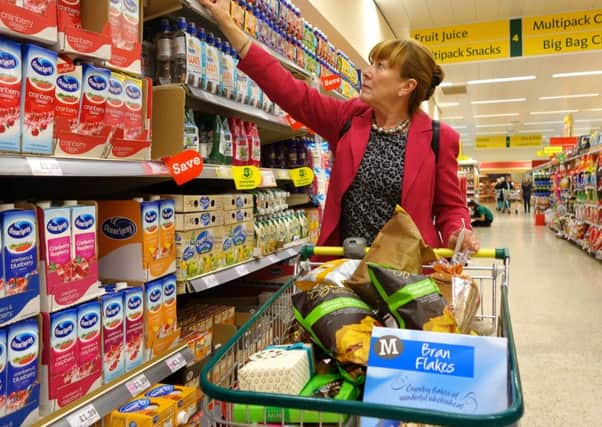Post-election boom fails to register at the checkouts


Year-on-year sales grew marginally by 0.2 per cent in the 12 weeks to 29 December, but despite retailers taking a record £29.3 billion – up £50 million on last year – 2019 saw the slowest rate of growth over the Christmas period for four years, analysts Kantar said.
While 23 December was easily the single busiest shopping day of 2019 – and the largest shopping day ever recorded for supermarkets – average household spending over the 12 weeks to 29 December fell by £8 to £1,055.
Total volume of sales fell by 0.7 per cent.
Advertisement
Hide AdAdvertisement
Hide AdSales of Christmas puddings were down by 16 per cent, while seasonal biscuits were 11 per cent lower.
Turkey sales also fell by 1 per cent, partly down to a shift from whole birds to smaller and cheaper joints such as crowns as cautious shoppers cut back on traditional and indulgent festive classics.
Sparkling wine sales dipped by 8 per cent, but beer and still wine were more popular than 2018, with sales up 1 per cent and 2 per cent respectively.
Like-for-like prices meanwhile only rose by a fractional 0.9 per cent, which was good news for consumers looking to control festive bills, but too low a level of inflation to boost the market.
Fraser McKevitt, head of retail and consumer insight at Kantar, said: “There was no sign of the post-election rush many had hoped for in the final weeks before Christmas, with shoppers carefully watching their budgets.”
Among the bricks and mortar retailers, Lidl led the way with sales growth of 10.3 per cent, while Aldi’s sales were up by 5.9 per cent.
Britain’s fastest growing grocer overall was Ocado, with sales rising by 12.5 per cent.
Sales at Sainsbury’s fell by 0.7 per cent, although its market share held relatively firm, dipping by just 0.1 percentage points to 16 per cent.
Advertisement
Hide AdAdvertisement
Hide AdTesco’s sales were 1.5 per cent lower, with its share down by 0.4 percentage points to 27.4 per cent.
Asda and Morrisons also saw sales fall by 2.2 per cent and 2.9 per cent respectively, with their market shares also dropping.
Separate data from Nielsen also shows that UK supermarkets experienced the lowest sales growth over the Christmas period in five years, at just 0.5 per cent in the past four weeks.
Nielsen’s UK head of retailer and business insight Mike Watkins said: “It is unsurprising that sales have remained relatively low over the December period, given that momentum continued to slow in the run-up to Christmas this year.
“Despite the festive season, consumers are evidently remaining cautious by taking advantage of greater price competition and special offers.”
The figures were released a day after Debenhams revealed the locations of the 19 stores due to shut in the UK this month, resulting in 660 job losses.
The closures, starting on 11 January, are spread across the country, from Kirkcaldy in Scotland to Eastbourne on the UK’s south coast.
The next tranche of outlet closures – 28 stores – are reportedly expected in 2021.